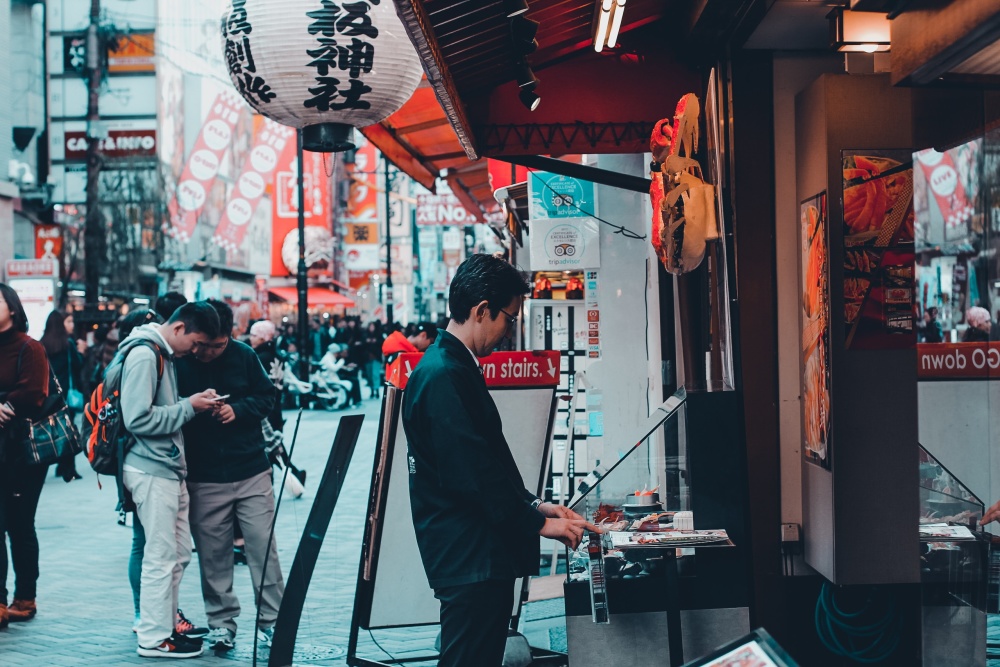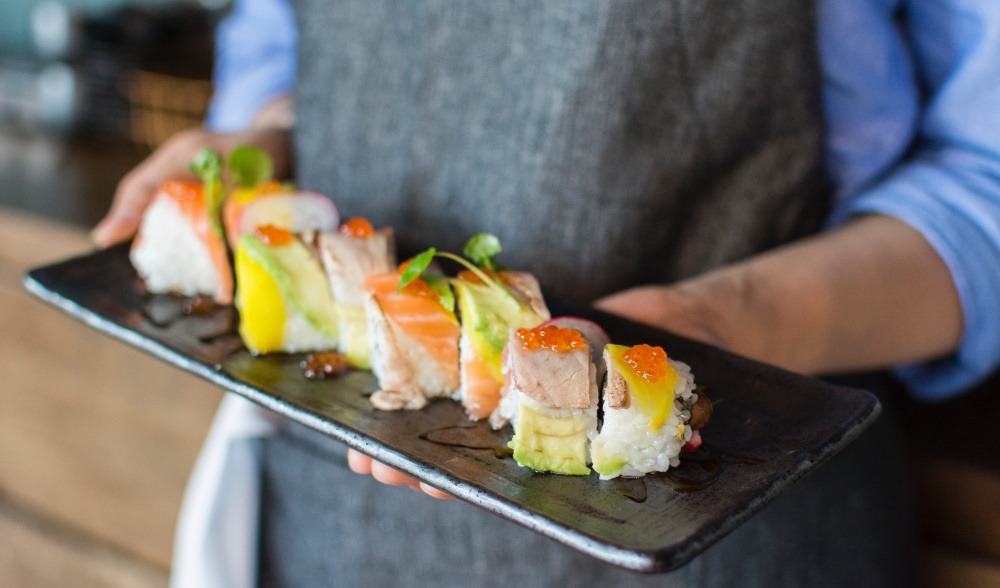Updated February 28, 2023
Basic Japanese Phrases You Can Use Today
Learning basic Japanese phrases has many perks. You’ll come across people who aren’t fluent in English when you’re traveling, shopping and eating out in Japan.
It’s best to be prepared for tricky scenarios — and knowing the basics can save you the headache.
In this article: 📝
- How to Say “Hello” in Japanese: Basic Greetings
- How to Say Basic Phrases in Japanese
- Useful Phrases When Shopping in Japan
- Useful Phrases for Traveling in Japan
- Useful Phrases for Everyday Life in Japan
- Useful Phrases for Accommodation in Japan
- Useful Phrases for Restaurants in Japan
- Basic Conversational Phrases in Japanese
- Conclusion
In today’s post, I’ll give you a rundown of the most common phrases in Japanese. Learning a few of these can make a big difference when you’re out and about. It’ll also give you a great head start if you’re serious about learning Japanese.
We’ll start with the fundamentals and common greetings, then move on to slightly more advanced stuff so that you can navigate more complicated situations.
How to Say “Hello” in Japanese: Basic Greetings
Before you can run, you need to learn to walk. Knowing how to say “hello” or “good morning” in Japanese can go a long way, even if you can’t carry a full conversation just yet. Here are basic greetings you can use in everyday life:
Kon’nichiwa (こんにちは): A simple “Hello” that you can use during the day.
Konbanwa (こんばんは): “Good evening” or “Hello” in the evening or at night.
Ohayou gozaimasu (おはようございます): a simple greeting that means “good morning.”
As you can see, the time of day matters when you’re greeting someone in Japanese. Even though these phrases can all mean “hello” they aren’t interchangeable.
Now that you’re ready to start a conversation let’s learn a few phrases you can use in almost any situation.
How to Say Basic Phrases in Japanese
Even if you’re not ready to learn Japanese just yet, knowing at least how to say “yes” and “no” can save you in a pinch.
Basic phrases such as “excuse me”, “thank you” or “you’re welcome” will also go a long way — they’ll help you feel like a part of the local culture.
Hai (はい): It means “yes.”
Iie(いいえ): It means “no,” but you can also say “no” instead if you’re unsure about the pronunciation. There are also other ways to say “no” depending on the situation, and you may want to read up on it in my blog post on how to say no in Japanese.
Arigatou gozaimasu (ありがとうございます): This is the formal way to say “thank you.” You can also just say “Arigatou” in an informal setting. However, saying thank you may be a bit more complicated than you may think. If you want to learn more, I have an article on how to say thank you in Japanese in every possible situation.
Dou itashimashite(どういたしまして): You can say this as a response to thank you. It means “you’re welcome.”
Douzo(どうぞ): You can add this to say “go head” or “feel free” when offering something to someone. If you’re asking for something or a favor, saying “Onegai shimasu” (お願いします) (formal) and “kudasai” (ください) (informal) is the way to go.
Daijobu(大丈夫): This can be a reassuring or compliant response to someone asking you to do something, and it means “all right” or “OK.”
Gomen nasai (ごめんなさい): A simple way to say “I’m sorry.”
Sayonara (さようなら): This well-known phrase means “goodbye,” but it implies that you’re saying it for the last time, or you won’t be seeing that person again.
These basic phrases can help you respond in small, spontaneous interactions. Now, let’s look at how you can navigate specific scenarios with a few useful phrases.
Useful Phrases When Shopping in Japan

When shopping in Japan, you may be surprised at how insistent shopkeepers can be. Sometimes you need to refuse an offer politely, but simply saying “no” or “iie” isn’t sufficient.
Here are some basic phrases that might come in handy when shopping in Japan.
Daijoubu desu (だいじょうぶ です): This is a simple way to reject someone who offers you something, and it means “It’s all right” or “I’m good.”
Atode mata kimasu (後でまた来ます): This sentence means “I’ll come back later.” Some Japanese shopkeepers may not leave you alone to shop in peace. They’ll try their best to convince you to buy their wares, and you might have a hard time trying to get them to stop. You can use this phrase to get out of the situation politely.
Iranai (いらない): It means “I don’t want it,” but keep in mind that this is a very direct, impolite way to say no. You can say Irimasen (いりません) too, which is the more polite version. You can use it when “Atode mata kimasu” isn’t enough.
Ikura desu ka? (いくらですか?): This sentence means “how much is this?”
Kore o kudasai (これをください): This means “I’d like to buy this” or “I’ll take this.”
Useful Phrases for Traveling in Japan

Finding someone who speaks English can be hard when traveling in Japan.
You’ll want to learn some of these phrases to navigate your way through the public transportation system in Japan.
Kippu uriba wa doko desu ka? (切符売り場はどこですか?): It means “Where can I buy tickets?”.
… ni wa dou ikeba ii desu ka? (...にはどう行けばいいですか?): Add the place you want to go to at the beginning of this sentence to ask how to go there. The sentence translates to “How do I get to …?”.
Kono densha wa … ni ikimasu ka? (この電車は...に行きますか): You can use this sentence to ask, “Does this train go to …?” Simply fill in the blank with the name of the place you want to go.
Sometimes public transportation gets too crowded, and you may feel like your personal space is being violated. If someone is touching or harassing you on a crowded train or a bus, you can say “Yamete kudasai” (止めてください) which means “please stop!”.
Useful Phrases for Everyday Life in Japan
When you’re out and about in a Japanese city, you’ll need to interact with the people around you. Using some of the following phrases can make you feel like you’re blending right in, or even get you out of sticky situations.
Kawaii (かわいい): This popular word means “cute”. Not to be confused with Kowai (怖こわい), which has a similar pronunciation but means “scary.”
Shikata ga nai (仕方がない): This phrase is very common in traditional Japanese culture, and it means “It is what it is.” It’s used in situations where nothing can be done. Since it implies helplessness and is used even in situations where something actually can be done, young Japanese people want to abandon this saying. Therefore, it’s best to say it sparingly.
Shouganai (しょうがない): A more informal version of the phrase above, it basically means the same thing. If this phrase were to be described with an emoticon, it would be the “shrug” emoji.
Otsukaresama (お疲れ様 ): This means “good job!” in Japanese, and it’s quite common to say it at the end of a work day. It implies gratitude for someone’s hard work rather than praise. You can also add “desu” at the end to be more polite.
If you’re an anime fan, you may be familiar with some of these phrases, but there are many more you’ll hear frequently. I wrote about common anime phrases extensively in another blog post. Head on over if you’re curious.
Useful Phrases for Accommodation in Japan
When you’re staying at a hotel in Japan, things might not always go according to plan. In case you have any problems, you can use some of these phrases to communicate your problems and needs.
Chekku in o onegai shimasu (チェックインをお願いします): A sentence that translates to “I’d like to check in please.”
Yoyaku shite imasen. Aiteiru Heya wa arimasu ka? (予約してません 空いている部屋はありますか?): If you haven’t made a reservation, you can use this sentence to ask for a room.
WiFi wa arimasuka? (WiFiはありますか?): It means “do you have WIFI?”. If the answer is yes, you can go on to say, “WiFi no pasuwa-do wa nan desuka?” (WiFiのパスワードはなんですか?), which means “What’s the WIFI password?”
… wa doko desu ka?” (...はどこですか?): If you’re looking for something, add it to the beginning of the phrase to ask for it. Some common words you can use are “Resutoran” (レストラン), which obviously means restaurant, “Eーtiーemu” (ATM), and “Puーru” (プール), which means pool.
Heya no kagi wo nakushimashita (部屋の鍵をなくしました): This means “I lost my room key.”
Taoru o moraemasu ka (タオルをもらえますか): Say this if you need towels. You can replace the word Taoru, which means “towels” with other words to ask for different things. For example, “Mōfu o mō ichi mai moraemasu ka” (毛布をもう一枚もらえますか) to ask for extra blankets.
Check-out wa nanji desu ka? (チェックアウトはなんじですか?): This is how you ask for the check-out time. If you need more time to get ready, you can ask if it’s possible to check out later by saying“Check-out no jikan o nobashite morau koto wa dekimasu ka?” (チェックアウトのじかんをのばしてもらうことはできますか?).
Useful Phrases for Restaurants in Japan

Basic Japanese phrases can save you a lot of headaches when you sit down to eat in a restaurant. You can’t expect every service worker to speak English, especially if you’re in a smaller city.
Besides, the staff will appreciate your effort as many non-Japanese people find Japanese too daunting to speak and don’t even make an attempt.
Here are some common phrases you can use at a restaurant in Japan:
Mizu o onegaishimasu (水をお願いします): You can ask for some water. It means “Water, please.” Japanese restaurants will usually give you complimentary water when you sit down to eat. Chances are, you’ll get it before you even need to ask, but you can always ask for a refill now that you know this phrase.
Chumon o onegaishimasu (注文をお願いします): When you’re ready to order, you can use this sentence to say “I’d like to order, please.” In some places, Japanese servers don’t come to take your order when you sit down. It isn’t poor service, they are just being polite so that you can take your time to decide without any pressure.
Itadakimasu (いただきます): This is a very common phrase people say before they start eating, and it roughly translates to “I humbly receive.” The phrase communicates your gratitude for the food.
Gochisosama deshita (ごちそうさまでした): As opposed to itadakimasu, you’ll hear this after a meal, and it means “thank you for the food.” You can use it with the servers and the restaurant staff.
Kore wa nan desu ka? (これは何ですか?): A sentence that means “What is this?”. There’s so much more to Japanese cuisine than just sushi. You may be unfamiliar with some of the ingredients and dishes on the menu. You can simply use this phrase and point to an item on the menu to find out.
… o kudasai (...をください): A very versatile phrase, this sentence means “Please give me …”. Add any word you want at the beginning of the phrase to ask for things you want.
Basic Conversational Phrases in Japanese
Last but not least, having a few conversational phrases in your arsenal can really help you out when you’re in need.
Onamae wa nan desu ka? (おなまえはなんですか): This means “What’s your name?”.
Watashi no namae wa _____ desu (わたしのなまえは__です): As a response to “what’s your name,” you can add your name in the blank to introduce yourself.
Ogenki desu ka? (おげんきですか): A simple phrase that means “How are you?”.
Genki desu (げんきです): A response to the phrase above, this one means “I’m doing well”, or “I’m good, thanks.”
Wakarimasen (わかりません): Another very useful sentence when you’re not fluent in Japanese, and it means “I don’t understand.” If you want the person you’re talking with to repeat themselves, you can say “Mou ichido kudasai” (もういちどください). It literally translates to “Can you say that again?”.
Sou desu ka? (そうですか): A common phrase you can use in various situations, this means “Oh really?” or “Is that so!”. This can be a great way to respond in many situations.
Kanpai (かんぱい): Cheers! This is an old phrase that translates to “dry cup” and is said before drinking as a toast. It can mean “Drink up!” or “Bottoms up!” as well.
Tanjoubi omedetou (たんじょうびおめでとう): This is one of the most common ways to say “Happy birthday!” in Japanese. However, there are other ways to wish a happy birthday, depending on who you’re saying it to. You can find out all about it in my blog post on how to say happy birthday in Japanese.
Ki o tsukete (きをつけて): While Sayonara implies finality, this phrase means “Take care”, and it’s used when someone’s going somewhere temporarily. It also means “Be careful”.
Conclusion
Learning Japanese can be intimidating at first, especially since Japan has a unique and complex culture, deeply rooted in the language.
The phrases I mentioned in this post are great to give you a headstart. They can give you the motivation you need to start learning the local language while living in Japan. It can also be a great way to make you feel like you’re less of a stranger.
While the phrases in this post are great for everyday situations, they are quite limited. Learning the language is a must if you want to feel like a local in Japan.
I have another post where I explained the difficulty and the nuances of learning Japanese. If you’re curious, head over to find out about it. I also have some tips on how you can start learning as a beginner.
Get Job Alerts
Sign up for our newsletter to get hand-picked tech jobs in Japan – straight to your inbox.







